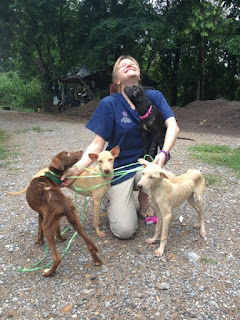As many of you know JMICAWE’s welfare veterinary nurse Hayley Walters and veterinary surgeon Heather Bacon used their annual leave to volunteer at a Government run dog shelter in Thailand after 3,000 dogs were intercepted and rescued whilst on their way to Vietnam for the dog meat trade there.
Hayley, the only veterinary nurse on the international vet team, and Heather spent 10 days, treating, nursing and vaccinating the sick and dying dogs in the shelter and found the experience very testing.
With 2,000 dogs living in buildings designed originally for pigs and with an actual capacity for only 400 dogs, it was understandably difficult for the 2 Thai Government vets and handful of staff to provide good welfare standards for each individual. Many of the dogs in the shelter were dying either from diseases such as distemper and parvovirus or starvation due to overcrowding and the dogs’ inability to compete for the food offered twice daily. It was the ineffectualness of the treatment and nursing and the cultural differences in relation to things like acceptance of euthanasia as a possibility, that they found particularly upsetting.
Palliative care was the best that could be offered and each emaciated, suffering dog in the sadly filled to capacity hospital was offered pain relief and, thanks to Hayley, a small sheet of cardboard to protect their bony bodies from the wire bottom cages as they tried to survive. Hayley said:
“As I filled up each dog’s water bowl and cleaned its cage in the 35 degree heat and relentless humidity I was dismayed at how little I was able to provide for the hundreds of patients in the hospital. Filling its water accounted for only 5% of what I actually wanted to do as a vet nurse. There was no time to bathe and lubricate dry, discharging eyes; properly clean dogs as they lay in puddles of diarrhoea. No time to administer much needed fluids or sit and hand feed an anorexic dog, or to tablet the dogs that had eaten around their medication or even to stroke the ones that looked enquiringly at me, offering limp tail wags and silently hoping for a gentle hand. There were so many dogs in the hospital and there was just not enough time to give them the basic care,…I just had to move on and clean out and top up the water of the next dog.”
What they did feel they achieved, and will hopefully continue now the team have left, is more humane handling techniques when moving and catching of the shelter dogs is necessary. The staff at the shelter are not knowledgeable about dog behaviour and have an understandable fear of being bitten and contracting rabies. Of the limited staff there, none of them were vaccinated and no one had received training on how to handle nervous - aggressive dogs.
” It was incredibly sad to see these frightened dogs, who had already endured so much, being so roughly handled using heavy neck graspers by the very people who were here to help them. I was really keen to demonstrate much more humane handling techniques whilst still maintaining the safety of the staff.”
By the end of their time there and with consistent safe but humane handling demonstrated, the staff learned how they could be much gentler and calmer with the dogs, the neck graspers were only used for the most dangerous of dogs and even then their bodies were supported when being lifted.
“ The reality of real world animal welfare is exhausting and depressing and I think I had a bout of compassion fatigue whilst out there. I walked away wondering what I had managed to achieve and questioning, once again, the ethics of long term shelters for animals. All these dogs…..these beautiful, friendly, individual characters….were all now facing a lifetime of captivity as anonymous souls in a dog saturated concrete pen. And why? Sadly, all because of some peoples’ dietary preferences and the illegal trade that occurs to support this. I know I didn’t address the underlying problems to change the world in my 10 days in Thailand, but I hopefully made a few dogs’ lives a little more bearable”.
Soi dogs, the charity that funded Hayley and Heather’s flights and hotel along with Worldwide Veterinary Services, employed more local staff to help with the ever growing influx of intercepted, smuggled dogs that arrived at the shelter. They have also funded the building of a new, improved purpose built shelter and continually advertise, via the internet, the new dogs that desperately need homes.
Hayley and Heather both adopted dogs whilst out there and they will be arriving in Scotland in the next couple of months. If anybody knows of anyone who would like to rehome one of the dogs currently living in the overcrowded shelter then please contact Soi Dogs. http://www.soidog.org/























